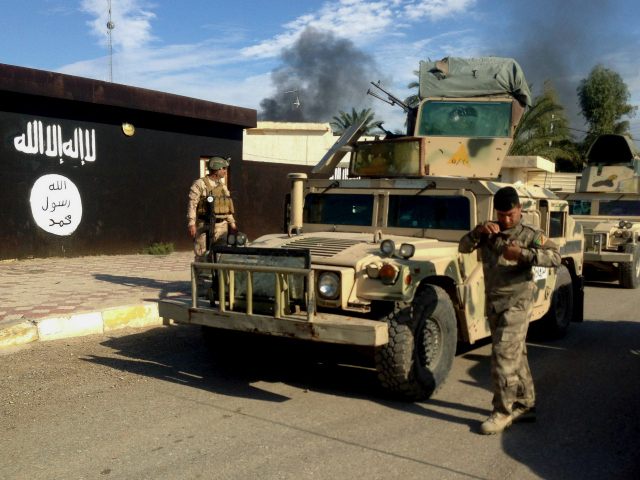The ongoing fight to retake Mosul from the Islamic State (ISIS/ISIL) is taking place in a political arena, rather than a battlefield, where Iraq’s rival ethnic and religious groups are duking it out over how to go about liberating the strategically important city, reports Foreign Policy (FP).
ISIS rose to power when it seized Mosul in June 2014.
“The battle to liberate Mosul from the Islamic State has begun,” notes FP. “But so far all the fighting is taking place in the political arena, with Iraq’s rival ethnic and religious factions mired in a power struggle over how to recapture the country’s second-largest city.”
“Virtually every major armed group in Iraq and their foreign patrons, including local Sunni Arabs backed by Turkey, Shiite militias supported by Iran, and American-equipped Kurdish forces are jockeying for a piece of the action,” it adds.
Sunni-majority Mosul borders the semi-autonomous Kurdistan Regional Government (KRG) region in northern Iraq and only a few hours drive separates the city from the border of Shiite powerhouse Iran.
Most Kurds are secular Sunni Muslims who are ethnically distinct from Arabs.
Citing unnamed U.S. officials, Foreign Policy reports, “Iraqi Prime Minister Haider al-Abadi has yet to forge a coherent political plan that can bridge the divide between the rival groups.”
For the KRG, which has recently renewed its call for a referendum on statehood, seizing parts of Mosul would secure the borders of an independent Kurdistan.
The operation to retake the city, the largest in the hands of ISIS, is reportedly backed by the U.S.-led coalition, Kurdish Peshmerga fighters, and Shiite militias.
Many Shiite militias fighting in Iraq, collectively known as Popular Mobilization Forces or PMF (Hashd al-Shaabi), are backed by Iran.
Despite the apparent unity between the rival groups involved in the offensive, only the first one to march into Mosul will have the most influence over who controls the city if and when ISIS is pushed out.
Friction between the different groups, namely the Peshmerga and Shiite militias, has already been reported.
“U.S. officials are wary of any scenario that skews the balance too far in favor of any one group — particularly proxies answering to Iran or Kurdish forces intent on carving out more territory,” points out Foreign Policy.
Iran-backed Shiite militias, including brigades linked to the terrorist group Hezbollah, along with Peshmerga forces, Sunni tribal fighters, and the Iraqi Army “have a different vision for how we get there,” a senior administration official told FP on condition of anonymity, referring to the recapture of Mosul. “If there’s too much PMF [Shiite militias] or Peshmerga elements, we’re going to have a problem.”
Last week, U.S. Vice President Joe Biden made a surprise visit to Iraq, his first since 2011, at a time when the country was mired in political unrest.
During his discussions with PM Abadi in Baghdad and KRG President Masoud Barzani in Erbil, the capital of Iraqi Kurdistan, Biden reportedly made an appeal to reach a consensus on how to retake Mosul.
“U.S. officials said they are prepared to stand down on lending artillery fire and air power once again if plans for Mosul failed to give Baghdad’s army a central role,” reports FP.
“Despite misgivings from Iraqi Army commanders and U.S. military advisors, the leader of one of the most powerful Shiite militias, Hadi Amiri, has insisted that his forces will be a part of any fight for Mosul,” it adds. “He leads a political organization once known as the Badr Brigades, which for years targeted U.S. troops in Iraq with so-called EFP [explosively formed penetrator] bombs from Iran.”
The Pentagon has estimated that taking Mosul will require between 8 and 12 Iraqi brigades, which amounts to more than 20,000 troops.
Iraqi leaders in late March announced that they had launched an assault to retake Mosul. More than a month later, the major operation has yet to pick up momentum.
Meanwhile, there is a stalemate between Abadi and Iraq’s Parliament over the prime minister’s efforts to overhaul his cabinet in efforts to fend off a challenge to his authority in Baghdad from prominent Shiite cleric Muqtada al-Sadr.
Fellow Shiite lawmakers who refused to give up their privileges are reportedly blocking Abadi’s move.
“Both the United States and Iran are supporting Abadi and his Shiite-led government, as neither country wants to see the Iraqi government fall when the campaign against the Islamic State has gained some momentum,” declares FP. “U.S. officials expect Abadi will survive the political turmoil but analysts warn he may emerge scarred and weakened, possibly leaving him more vulnerable to pressures from harder-line Shiite militias.”

COMMENTS
Please let us know if you're having issues with commenting.